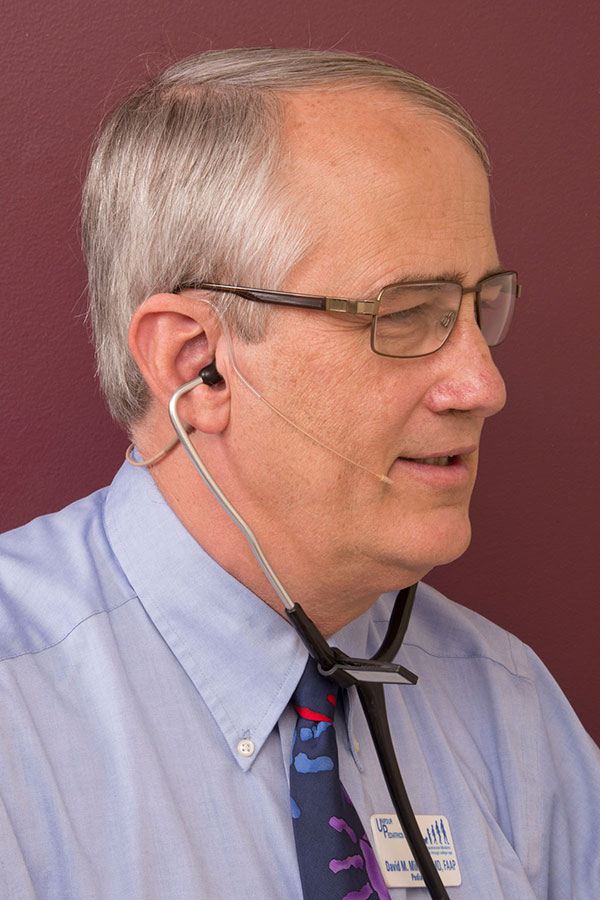Countryman Earset Microphone Solves Medical Documentation Challenges

Dr. David Millsaps wears his Countryman E6 Earset.
Directional E6 Earset streamlines input with Nuance Dragon Medical Practice Edition
Hickory, NC – September 2014 Recent health care changes—such as new documentation requirements, electronic medical records, and increased pressure to complete documentation during the patient’s actual office visit—have created new challenges for medical professionals. While laptop computers and tablets have certainly increased computing mobility, the need for real-time data entry into electronic medical records (EMR) has become quite a challenge—particularly if one’s typing skills are marginal. To better meet the demands of his profession while streamlining the data input process, David M. Millsaps MD FAAP of Unifour Pediatrics PA reports that he has found a better way, thanks to his use of Nuance Dragon Medical Practice Edition 2™ and his directional E6 Earset Microphone from Menlo Park, CA-based Countryman Associates.
Dr. Millsaps has continuously practiced primary care pediatrics in the Hickory, NC area for the past 34 years and maintains full admitting privileges at both Catawba Valley Medical Center and Frye Regional Medical Center. He described the challenges he and many of his colleagues typically encounter, “Unfortunately, many physicians’ typing skills (including my own) are inadequate and, hence, we simply cannot keep up with the more recent documentation requirements of our profession. Realizing this issue, I began searching for an alternative input process and discovered that voice recognition software has significantly improved and has now become a more important component of medical practice, and in some cases, has become mandatory.”
Dr. Millsaps reports that Nuance Dragon Medical Practice Edition 2, which is a sophisticated professional version of the more general Dragon NaturallySpeaking™ application, is optimized for use in medical office environments. When used in conjunction with eClinicalWorks electronic medical record (EMR) software, the ability to capture and organize all the data that physicians must document is impressive. In a quiet room, it’s quite accurate, easy to use, and a great time-saver. Unfortunately, most microphones simply aren’t designed to allow real-time voice recognition dictation (hands-free, ears-free) in busy, noisy, and disruptive pediatric exam room settings, with stethoscopes in and out of the ears.
“There are several microphone-specific challenges when seeing patients and performing real-time dictation in patient exam rooms, especially with pediatric patients,” Millsaps explained. “But now—thanks to the Countryman E6 microphone—there’s a solution. Prior to my use of the Countryman E6, I frequently encountered a variety of microphone-specific issues. These included noise—talking, crying, laughing, and coughing children in the same exam room—that made it impossible for lesser microphones to function well and reject the ambient noise during real-time dictation. The signal-to-noise ratio (my dictation combined with child noise) was horrendous, causing frequent misrecognition errors. The need for a hands-free microphone is crucial to simultaneously use the mouse and keyboard, use hand gestures as we explain things to families, and to avoid wasted time constantly adjusting the mic position. Unfortunately, most hands-free mics are far from the mouth, unstable in mic location, and/or require ‘in-ear’ or ‘under-ear’ stabilization structures or headphones, all of which are painfully visible, and look ‘geeky’ or intimidating to families and staff. If mics are not ‘ear-free’ and low-profile, then frequent stethoscope use is awkward, requiring taking off and putting on the mic with each stethoscope use, and become tangled up with stethoscopes and or glasses. Fortunately, with the E6, I finally have a microphone that addresses all these points.”
When queried about his specific setup, Dr. Millsaps reports that his E6 is being interfaced to his Fujitsu 902 laptop/tablet computer using a Shure X2u XLR-to-USB connector adapter that is worn below his tie. The 2 mm microphone cable run is within his shirt. From the other end of the Shure adaptor, there is a short three-foot right-angle USB cable that attaches to the side of the laptop/tablet. This arrangement makes it very easy for him to connect and disconnect as necessary. “I love the E6’s thin 1 mm diameter, moldable flesh-colored boom that extends to the mouth,” he said. “This, combined with the over-the-ear design makes the mic all but invisible. It’s light, so the fit is comfortable and secure. And since my E6 is the directional model, the microphone rejects a high percentage of the ambient noise around me and this is what enables the software to accurately transcribe what I say.”
As a medical professional, Dr. Millsaps wouldn’t be expected to have an audio professional’s background and experience. This, however, is where Countryman’s support services have proven to be exemplary. “Countryman’s customer and technical support services are excellent,” Millsaps says. “When contacting the company, I’ve experienced prompt attention to my questions and concerns, along with polite, effective responses, and a caring attitude.”
Before turning his attention back to the day’s business, Dr. Millsaps offered these parting comments, “Right from my first communication with the Countryman team, I felt they wanted to solve my concerns completely. They always treat me as a business partner—not just as a customer. I’m as pleased as I can be with my E6 purchase. The microphone’s audio performance is outstanding, the fit is secure and comfortable, it’s barely visible, and it’s proving to be an ideal match for use with my software. I enjoy it every day.”
For more information about Dr. Millsaps and Unifour Pediatrics, go to www.unifourpeds.com.


